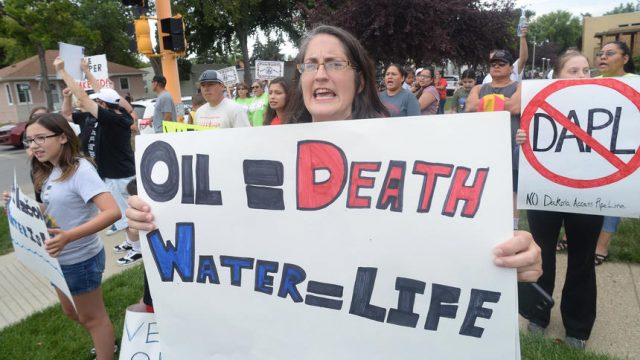Should Dakota Access Protesters Reimburse North Dakota Taxpayers for the Cost of Law Enforcement Presence?

Protest organizer Kristen Kelsch hold a sign and chants across the street from the State Capitol in Bismarck on Thursday. A line of police prevented Kelsch and others from hold the protest to the Dakota Access Pipeline on the Capitol grounds
Earlier this year bombastic presidential candidate Donald Trump visited North Dakota, addressing a conference in Bismarck put on by the North Dakota Petroleum Council.
Trump, I don’t need to tell you, is a controversial figure, and with about 7,000 people in attendance at the conference and protests of the visit planned, local law enforcement put in some extra effort to make sure everyone was safe. According to the Bismarck Tribune, “56 Bismarck police officers, 39 highway patrolmen, 19 Burleigh County deputy sheriffs and seven Bureau of Criminal Investigations agents worked the event.”
All this extra manpower for Trump’s visit ran up a bill – roughly $13,000 – which was sent to the NDPC for payment.
Now let’s flash forward to the protest of the Dakota Access Pipeline. Protest organizers claim they have thousands gathered to try and block the pipeline (the New York Times today reports that it’s more like “hundreds”), and the protesters themselves have been something less than respectful of the law.
With the estimated cost to taxpayers of the law enforcement presence at the protest site estimated to be $100,000 per week, should the Standing Rock tribe and other protest organizers pick up at least some of that tab?
Let me be clear, before you answer “yes” that we need to be careful that security costs aren’t used as a sort of tax on protest activity. The 1st amendment protects peaceful, and law enforcement providing a certain level of security falls under the umbrella of just, you know, doing their jobs. It’s what we pay them for.
The problem is that the Standing Rock protesters, through their actions, have created far more need for law enforcement presence than a truly peaceful protest would need.
“There is definitely an element in there that wants this to be a confrontation” Cass County Sheriff Paul Laney said yesterday. “They’re rhetoric is very confrontational, violent at times.”
“When you take over somebody else’s property and block their access to it, even though you’re really nice about it, it’s still against the law” Laney added. “It’s not peaceful.”
There’s the rub.
Not only have the protesters repeatedly broken the law by trespassing, blocking the state highway, and other sorts of disorderly activity, but many of them have made ominous comments about future violence. This from a Mike Nowatzki article published four days ago (emphasis mine):
“You have the pacifists and then you have the people who feel something should be done, and they’re camped across the river from each other,” said Jesse Stevens, 32, a member of Wisconsin’s Menominee and Oneida tribes.
Stevens and two other men from Keshena, Wis., left Friday evening and arrived Sunday night, delayed by a broken water pump on his GMC Jimmy. While they set up camp on the “peaceful” side, Stevens said he felt like he should be across the river.
“My point in coming out here was some kind of action, regardless of whether it’s life-threatening or not,” he said. “This is our land, our people.”
When you consider that there have been acts of vandalism against this pipeline elsewhere along its route you begin to see that protesters have created an extremely volatile situation at which a heavy law enforcement presence is certainly warranted.
So why shouldn’t protest organizers, who have not organized a peaceful and lawful protest, pay some of the cost of policing and securing the protest?




